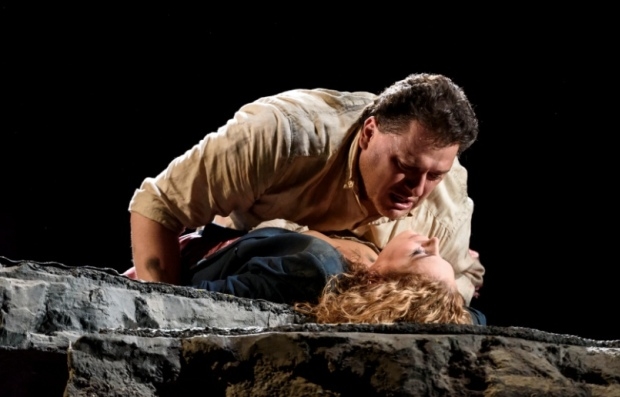Review: Manon Lescaut (Royal Opera House)
Sondra Radvanovsky dominates the first revival of Jonathan Kent’s 2014 production

© Bill Cooper
She’s a hussy, that Manon Lescaut, and no better than she ought to be. Puccini’s opera from Abbé Prevost’s novel scores over Massenet’s setting (just called Manon) by depicting its heroine as a flighty opportunist rather than a romantic ingénue. Its quartet of taut, short acts bring her closer to Lulu than Violetta, although a better parallel might be found in Voltaire’s Candide.
"Here I am in Paris, France/Forced to bend my soul to a sordid role/Victimised by bitter circumstance" trills the abased Cunégonde in Bernstein’s musical version, and Jonathan Kent reserves a similar fate for Puccini's heroine in his second act. In Paul Brown‘s imposing designs Manon’s cage is perspex rather than gilded, a peep-show salon where dirty old men can lap up live porn.
This hapless lass had been convent-bound in the previous act, but that was before her beauty caught the attention of both Geronte (a bass, therefore nasty) and des Grieux (a tenor, therefore nice). Kent’s modern-day setting works well for three of the acts, its dystopian nowness appearing increasingly prescient by the time poor Manon succumbs in the heat of an apocalyptically ruined American freeway.
The third act, though, is baffling and bears little relation to Puccini’s intended quayside setting. Even after a second viewing (the show first appeared in 2014) I don’t pretend to understand what Kent is driving at with his red-light-district windows, vast lighting gantries, creepy master of ceremonies and reality show aesthetic. It’s more a muddle than a meat market.
Pappano conducts with punch and pizzazz
Still, Paul Higgins‘s tight, assured revival boasts a riveting Manon in Sondra Radvanovsky, her voice large yet fresh with no trace of tightening in the higher register and a full-on engagement with her character. The soprano, too rare a visitor to these shores, turns the minor Puccini of "In quelle trine morbide" into something profound. Radvanovsky elevates her character out of squalor: if she’s not pure at least her jewel-like arias are.
In this alchemy she is at one with Antonio Pappano, whose conducting has the punch and pizzazz he invariably brings to Italian romantic opera. From the surging prelude and expository musings of the youthful Edmondo (Luis Gomes, excellent), he draws effulgent playing from the ROH Orchestra and plays Manon Lescaut as mature Puccini rather than the work of a composer-in-progress.
Aleksandrs Antonenko, the stolid des Grieux, is always a reliable tenor but his vocal style is more histrionic than romantic, which is why heroic Verdi roles suit him better than Puccini. Eric Halfvarson, on the other hand, lends a voice of fresh bitumen to the ghastly Geronte, with Levente Molnár on similarly fine form as Lescaut, Manon’s brother and accidental pimp. Among smaller roles, Aled Hall as an exotic Dancing Master and Emily Edmonds as an erotic Musician both impress.
Kent’s staging successfully depicts a flawed woman’s losing battle against base human instincts, but it ducks the opportunity to explore the psychology behind it. What makes Manon tick? What drives des Grieux in his amour fou? What, indeed, happens to them between acts? Manon Lescaut is a tragedy, but it’s hard to empathise with either character on their road to perdition. Only one thing emerges clearly: that convent would have been a good career move.
Manon Lescaut runs in repertory at the Royal Opera House until 12 December.












